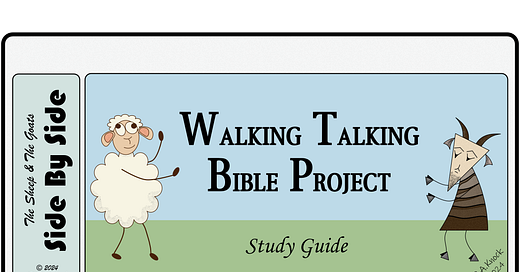This is the Study Guide for the Walking Talking Bible Project. More detailed instructions for some questions can be found here.
Study Guide Instructions
Copy the memory passage and keep it with you throughout the week. Recite it and think about it several times each day. Make it your goal to memorize the text of the passage together with its reference by the end of the week.
Read and answer the questions in the study guide to the best of your ability.
Test your answers, especially guesses. If you don’t find the correct answer, hold on to the question and wait for the answer to be revealed later in your studies.
Treat disagreements in the study tools the same way you treat your guesses. Consider everything, but only accept as truth what you can verify.
More detailed line-by-line instructions can be found here.
Study Guide
1. Main Points
What appears to be the main point of the memory passage?
What appears to be the main point of connection passage #1?
What appears to be the main point of connection passage #2?
What appears to be the main point of connection passage #3?
Do the connection passages seem to reinforce, clarify, expand, limit, contradict, or negate the memory passage? How?
.
What, if any, similarities or differences did you notice between the Old Testament and New Testament passages?
.
2. Contrasts & Conditionals
What contrasts, if any, including consequences, are presented in the Bible passages this week?
.
What conditional (if-then) statements, if any, are included in the Bible passages this week?
.
3. Salvation & the Gospel(s)
What, if anything, do the Bible passages this week say about salvation and/or the gospel(s)?
.
4. Jesus & the Kingdom
What, if anything, do the Bible passages this week tell us about Jesus?
.
What, if anything, do the Bible passages this week tell us about the Kingdom?
.
5. Personal Relationships
What, if anything, do the Bible passages this week say about our relationships within the church, within the family, or in general?
.
6. Church and Worship
What, if anything, do the Bible passages this week tell us about the Church and/or worship?
.
7. Calls to Action
In the Bible Passages this week, what kind of action, if any, was the original audience told to take? Does this call to action apply to us today?
.
8. Scriptural Context
Read the verses immediately preceding and following this week’s Bible passages. Most Bibles have headings that can help indicate where a topic begins and ends.
Considering this context, what changes, if any, would you make to the main points you listed in #1?
.
Look up cross-references. What additional insights, if any, do these provide?
.
9. Additional Contexts
Use study tools (Study Bible notes, commentaries, Bible dictionaries, etc.) to find information about the literary, historical, cultural, and grammatical contexts.
Considering this additional context, what changes, if any, would you make to the main points you listed in #1?
.
10. Consider Potential for Error
Carefully read and think about this week’s passages. How could they be misread or misunderstood?
What unsupported assumptions could someone make?
.
Which, if any, of the Bible passages this week could be used out of context to say something different from what the author intended to say?
.
What people, groups, or ideologies might be uncomfortable with these Bible passages?
.
What are some different ways that people or groups with different presuppositions, points of view, or agendas could try to use or misuse this week’s Bible passages?
.
How could you argue for a correct biblical understanding of the Bible passages?
.
11. Application
Having hopefully come to a proper understanding of this week’s Bible passages, how should Christians respond? In what ways, if any, do these passages call for changes in attitudes, beliefs, or actions?
How should individuals respond? How might that response affect individuals and families?
.
How should local church communities respond? How might that response affect a church’s worship, fellowship, spiritual growth, and witness in the wider community?
.
How, if applicable, should Christians respond politically? What effect might that have?
.
What people or groups might disagree with your answers to the above questions? How and why might they resist or oppose your suggested responses? How might you respond to their objections using Scripture and reason?
.
12. Other Observations or Questions
While this material is still fresh in your mind, take a moment to list any other observations or questions you may have. Then file your notes away so you can come back and revisit them later.
.
.
Congratulations! You’ve completed this module. Remember to review the memory passage throughout the week so you will have it confidently committed to memory before beginning the next module.
All Scripture quotations, unless otherwise indicated, are taken from The Berean Standard Bible (BSB).





